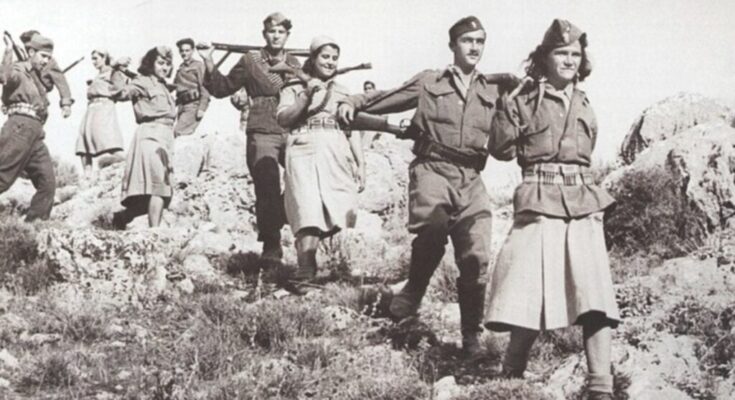
The role of Greek women during WWII was of pivotal importance. We often speak of the heroic deeds of great men, yet the contribution of the women of these harsh times and their significant support of the men is indisputable.
The women of Epirus
The Greek army that faced the Italians in 1940 did not allow women to fight alongside men. Nonetheless, they acted in the most heroic of ways. The women of Epirus, for instance, opened up their homes to accommodate Greek soldiers. They also provided other needed items such as sustenance, blankets, and clothing, even feeding the horses of the military.
The women of Epirus were known for knitting socks and other clothes to help keep Greek soldiers warm during the cold days of the war. In the Pindus Mountains, temperatures often became dangerously frigid. Women of all ages even carried ammunition.

Climbing up steep ravines in extremely challenging weather conditions, these heroic women even nursed the men, carrying wounded soldiers to safety and providing first aid. In addition, they helped army engineers in the arduous task of opening and repairing roads and bridges during the Greco-Italian War.
The emergence of women in the resistance
It was during the Axis occupation of Greece and the struggle for liberation that the role of women changed, and they began taking on a more active position in warfare.
The women of Greece participated in the resistance movement on all fronts from the National Solidarity social welfare organization of the National Liberation Front (EAM), an alliance of organizations and political parties which fought to free Greece from Axis Occupation, to demonstrations against Nazi occupiers. Furthermore, they partook in neighborhood survival efforts, including in guerillas, taking up arms as needed.
Out of the three million members of National Solidarity, 1.74 million were women, and 1.26 million were men.
Greek women in combat
Women guerillas of #Greek People's Liberation Army, or ELAS (ΕΛΑΣ). #History #WWII pic.twitter.com/O6GTnCIHBn
— World War II History (@WW2Facts) August 26, 2018
EAM was not merely the strongest partisan organization during the German occupation of Greece. It was also the first to actively recruit women for combat. The women who joined the armed resistance initially fought side by side with the men. As their numbers grew, they formed their own exemplary platoons. These included the larger units, and the courage of many women was remarkable indeed, greatly surpassing that of the men.
In Thessaly, 16-year-old Maria Kalamboka adopted the nickname “Yiannakis” and worked closely with the rebels beginning in 1942. Moreover, in Macedonia in September 1943, an EAM newspaper reported that “the women today took up arms and went to the mountains,” becoming “pioneer[s] in all forms of struggle in our fight.”
At the same time, when Chrysoula Tamia-Jefroni was assigned to the 50th Regiment of Pieria, there were already three to four female guerrillas there. The EAM-owned newspaper Women’s Action (5/24/43) published the letter of Asimoula, a rebel in Parnassos complete with spelling mistakes. She begged for woolen socks and sweaters to be delivered to her.
The editorial, in its commentary, pointed out that “she was not taught any letters. And yet this Asimoula went out to the mountain,” concluding with: “The example of your life will illuminate the right path for us.”
How WWII influenced the rights of women in Greece
WWII changed the lives and roles of women in Greek society in many ways. Even though the first waves of feminism in Greece had begun some decades earlier, the resistance was a defining moment.
Many women, having gone up to the mountains as guerrillas and even taking up arms under certain circumstances, gained increased confidence in their roles in society and no longer allowed themselves to be relegated to the role of a mere companion as per earlier social norms.
An EAM newspaper published an article titled: “Woman, how dare you go out on the street? Aren’t you ashamed, don’t you respect your name?” The female partisan responded, “I do go out because I am Greek.”
In May 1943, the magazine Young Generation published a letter from Kostoula, “the pride of the high school” from Roumeli, who went out to the mountains. Kostoula writes, addressing her classmates:
“So what if I am a woman? Am I not a daughter of the same country? And the country today needs all its children…I know I won’t be alone. Today it was me. Tomorrow it’s your turn, girls. Good luck.”
Redefining womanhood during WWII
Through the resistance, the role of women in society was re-imagined and elevated, with women henceforth being deemed key contributors to the preservation of the nation both in terms of the family and communal units.
We should note that the Political Committee of National Liberation, the resistance government of Greece, was the first government to call upon women to vote and participate in political affairs.
Moreover, even for women who were not partisans, World War II provided opportunities for employment and financial independence. As the number of men in the labor force took a hit due to the war, the number of women contributing to the economy rose dramatically as was also the case throughout the Western world. Greece was therefore no exception.



